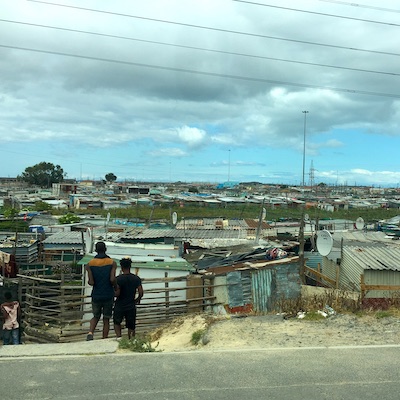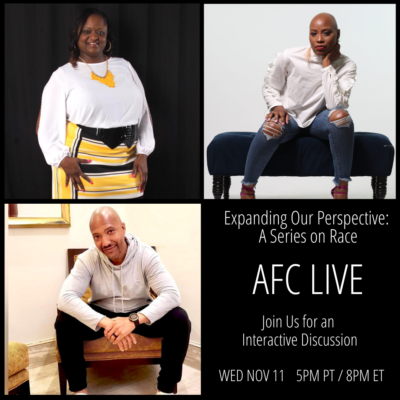Finding My Voice: How I Am Learning to Step Up and Into Difficult Conversations about Race
The conversation is etched in my brain and I still wish I could go back and handle it differently.
It was a holiday gathering of friends and family in Canada in late 2017. I had just returned from running an AFC Odyssey Program in South Africa and found myself standing in the kitchen making small talk with a white guy about my age, as the sound of Christmas carols filtered through the speakers beside me.
“How was your trip?” he asked.
I’m never quite sure how to answer this question, especially because the work we do with A Fresh Chapter is not about taking vacations to far-flung destinations, although at a cursory glance, it can appear that way on social media.
Sometimes – rather than getting into the details of the volunteer work or how supporting people impacted by cancer can be humbling, difficult, and inspiring all at once – it’s easier to answer a question like this with a simple, “It was great, thank you.”
But, that day something about the holiday spirit and the buzz of conversations around me made me want to give more than my stock answer.
 So I told him about the District 6 Museum in Cape Town and what I had learned about how – in the early ‘80s during the height of the apartheid era – the government had ripped families apart and bulldozed through a vibrant multi-cultural neighborhood. I spoke about the heartbreak of seeing the oppression Black people continue to face in South Africa, even decades after the end of apartheid.
So I told him about the District 6 Museum in Cape Town and what I had learned about how – in the early ‘80s during the height of the apartheid era – the government had ripped families apart and bulldozed through a vibrant multi-cultural neighborhood. I spoke about the heartbreak of seeing the oppression Black people continue to face in South Africa, even decades after the end of apartheid.
I saw something shift in his face as he reached for his beer and took a swig.
“But it’s not just Black people who have been oppressed,” he said. “Lots of people deal with hard things. There is so much attention right now about Black lives – but shouldn’t all lives matter?”
I saw him stand up a little straighter and I could swear that his chest puffed up a bit. He went on to tell me that he and his computer programming friends were talking about how they should start creating “white lives matter” signs to post all over the internet.
His words sliced through me. My body vibrated with shock and I found myself somehow… frozen. I wanted to wipe the smug expression off his face. The imagery of South Africa came flooding back to me. I could smell the exhaust from the crowded matatu taxis and hear the music that floated out from between the tin homes on the day our group traveled into the townships to learn from those who continue to face more adversity than I would ever know in my lifetime.
I took a breath while my mind scrambled for what to say. Instead of an eloquent response, I found myself tripping over my emotions and my words. The lump in my throat grew as he nonchalantly sipped his beer, convinced that I must now agree with his point of view. I felt too angry to form a coherent thought, so I excused myself and then avoided him for the rest of the night.
 As I walked away, I felt a hot flush of shame wash over me. Why hadn’t I done a better job of making him see beyond his very narrow perspective of the world?
As I walked away, I felt a hot flush of shame wash over me. Why hadn’t I done a better job of making him see beyond his very narrow perspective of the world?
It wasn’t until a few months later when I met my now-boyfriend that I began my ongoing education about white privilege and systemic racism in the United States – and started to see the parallels between South Africa and the U.S. It was something I had not been exposed to growing up in Canada. Since beginning this education, I’ve learned that it’s up to me – and other people that look like me – to figure out how to deal with the discomfort of having difficult conversations in order to stand up against injustice and oppression.
Discomfort. I know I don’t really understand what it means to feel truly uncomfortable. Not like the man I love does. Feeling uncomfortable, for him, is unavoidable in this country. Whether it’s a woman who crosses the street and clutches her purse when she sees him walking towards her on a downtown street, or police cars that scream up a sleepy North Vancouver street or a security guard that accuses him of stealing a green juice from Whole Foods – he faces situations that are deeply demoralizing and uncomfortable almost every single day.
I have learned so much from him. The security guard, the officers, and the purse-clutcher could all learn so much from him, too. And yet, it’s not his job to educate me or others who are so blinded by their bias that they can’t see reality. He’s got enough on his plate just dealing with the daily challenges of being a Black person in this country. It’s our job – the people with white privilege – to figure out what to say and then to say it, during those awkward, infuriating, and often deeply painful moments when someone says something racist.
I can’t go back and rewrite the script of that conversation in 2017. But I – along with so many others – can make efforts to prepare for the conversations yet to come.
can’t go back and rewrite the script of that conversation in 2017. But I – along with so many others – can make efforts to prepare for the conversations yet to come.
So, where do we begin? Knowing how to handle these difficult conversations is hard and uncomfortable. But it is possible to find a way out of those furious and frozen moments.
In part 4 of our AFC Live series: Expanding Our Perspective on Race, we will explore how to navigate difficult conversations. This month, we have collaborated with our incredible co-hosts to create a session even more informal and free-form than usual, as we frankly discuss the challenges of having difficult conversations in these divisive times. We will discuss tough scenarios and exchange ideas around how to navigate these complex interactions with peers and loved ones.
Join us at 8 pm ET / 5 pm PT on Wednesday, Nov 11th. Sign up now and bring a friend.



No Comments